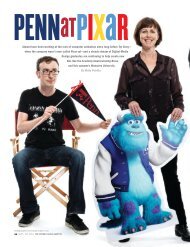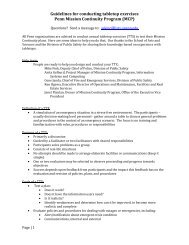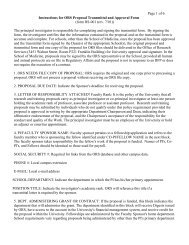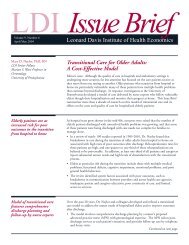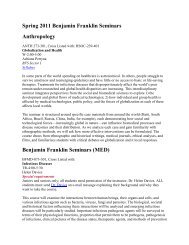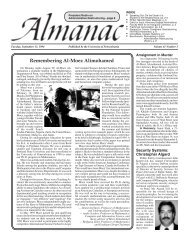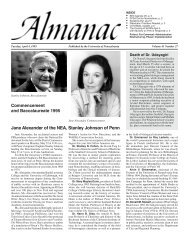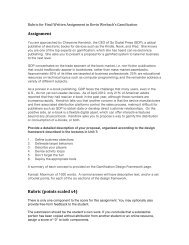PENNPRINTOUT - University of Pennsylvania
PENNPRINTOUT - University of Pennsylvania
PENNPRINTOUT - University of Pennsylvania
You also want an ePaper? Increase the reach of your titles
YUMPU automatically turns print PDFs into web optimized ePapers that Google loves.
evolution is putting libraries and librarians, as they come<br />
on line, out <strong>of</strong> the loop.<br />
The age <strong>of</strong> the paper book and journal is far from over<br />
and we will yet fill many libraries before it is, but much <strong>of</strong><br />
the information we produce and use is never getting into<br />
the libraries and when it does librarians have no idea what<br />
part <strong>of</strong> the whole they have got their hands on. This is<br />
bound to affect scholarship.<br />
Modern standards <strong>of</strong> scholarship rely on the assumption<br />
that scholars should be able, through their libraries or<br />
through bibliographic services, to read all <strong>of</strong> the relevant<br />
literature. The electronic revolution threatens those<br />
standards by making it virtually impossible to judge<br />
scholarly performance in this respect. We will know<br />
whether the argument is sound, the data adequate, and the<br />
writing good, but we will not be able to tell whether all <strong>of</strong><br />
the relevant information is accounted for.<br />
We are entering new oceans <strong>of</strong> knowledge, and we<br />
will either have to develop new charts or to change our<br />
expectations <strong>of</strong> navigation.<br />
My third guess at the future is full <strong>of</strong> optimism.<br />
Optimism<br />
While I’m in a seafaring metaphor, I should say that I<br />
empathize with Columbus—I’m a historian after all—and<br />
I am no less optimistic than he was. I think the university<br />
will go through some tough times, but I think it will come<br />
through them just fine in the end. The university has been<br />
one <strong>of</strong> our stablest and most enduring institutions. It has<br />
adapted to change for over eight centuries. It has had its<br />
ups and downs; it has been pushed aside at times; but since<br />
its invention in the second half <strong>of</strong> the twelfth century it has<br />
never been far from the center <strong>of</strong> the knowledge industry.<br />
It arose in Europe, but it is now dispersed throughout the<br />
world.<br />
My optimism about the future stems from a conviction<br />
that the university has proven itself to be the world’s most<br />
consistent producer <strong>of</strong> new ideas, and given the stresses we<br />
humans are putting on our planet, we will not soon cease<br />
to need new ideas. In this respect, the institution’s secret<br />
may lie in the union <strong>of</strong> teaching and research. We make<br />
knowledge in many kinds <strong>of</strong> institutions—government<br />
laboratories, industrial laboratories, and, now, on the<br />
Internet—but none <strong>of</strong> these sites <strong>of</strong> research provides the<br />
elemental protection <strong>of</strong> pure curiosity, <strong>of</strong> basic research,<br />
that the university provides.<br />
The protective shield is, I think, partly a product <strong>of</strong> the<br />
teaching function. Education, as opposed to training,<br />
requires the freedom <strong>of</strong> the wide open range. It is a<br />
product <strong>of</strong> intellectual roaming, <strong>of</strong> the exploration <strong>of</strong> new<br />
subjects. It is both the result and the producer <strong>of</strong> the<br />
philosophic habit that Cardinal Newman labeled the basic<br />
characteristic <strong>of</strong> the educated person, and philosophy is the<br />
theoretical pursuit par excellence. So, if the educational<br />
process is philosophical, then the place in which it occurs<br />
must be the maker <strong>of</strong> new ideas.<br />
The youth <strong>of</strong> the students may also play a part in<br />
building the shield that preserves the university. Youth has<br />
the luxury <strong>of</strong> ignoring the practical goal and purpose <strong>of</strong><br />
knowledge. Youth can be philosophical and can learn the<br />
philosophic habit by practice. We all bemoan the narrowing<br />
careerism <strong>of</strong> many <strong>of</strong> our students—the first university<br />
faculty in the twelfth century bemoaned it also—and our<br />
disappointment arises from the recognition that our<br />
students have a choice. They are young enough to hold <strong>of</strong>f<br />
for a few crucial years the awful baying <strong>of</strong> practical<br />
concerns.<br />
Our regret in finding our older students focused on<br />
making it in the world is correspondingly mild. We know<br />
that, youth gone, they must take the baying seriously and<br />
get on with it. Our hopes for their education are not<br />
invested so much in the intellectual treks on which we lead<br />
them as in what they have and will experience as adults.<br />
We hope that they will catch the philosophic habit by some<br />
lucky chance as they run through our courses.<br />
But the university will also be preserved and protected<br />
by another <strong>of</strong> its characteristics. It is an institution that<br />
satisfies a fundamental condition <strong>of</strong> knowledge making—<br />
face-to-face interaction among the craftsmen <strong>of</strong> the guild.<br />
Intellectual work is social work, notwithstanding the myth<br />
<strong>of</strong> the solitary genius, and the university is a social<br />
institution. The Internet can enhance the society <strong>of</strong> the<br />
university and quicken its pace <strong>of</strong> discovery and invention,<br />
but the electronic environment cannot replace physical<br />
human society. We humans cannot thrive in a bodiless,<br />
frownless, smileless ecology, and our intellectual society<br />
cannot be complete without physical interaction. The real<br />
university may be enriched and enlarged by the virtual<br />
university, but there will always be the real one.<br />
So, the electronic revolution—the birth <strong>of</strong> the virtual<br />
university—will force us to work out some new rules <strong>of</strong><br />
assessment and to learn some new ways to manage the<br />
university community, but so long as society is healthy<br />
enough to need educated citizens and new knowledge, it<br />
will push us to accomplish these tasks rather than dismantling<br />
our institution. If we do manage the multiple and<br />
complicated changes coming at us at electronic speed, we<br />
will create a university that is even more intensely local<br />
than it is now, while its physical boundaries and limitations<br />
will have faded into the ether <strong>of</strong> the net.<br />
Note: This article contains the text <strong>of</strong> a dinner address<br />
presented at the Virtual <strong>University</strong> conference in January<br />
1995. The conference was sponsored by the SEI Center<br />
for Advanced Studies in Management, the Annenberg<br />
School for Communication, and the School <strong>of</strong> Engineering<br />
and Applied Science. The Penn Printout version contains a<br />
few minor modifications.<br />
STANLEY CHODOROW is Provost <strong>of</strong> the <strong>University</strong> <strong>of</strong><br />
<strong>Pennsylvania</strong>.<br />
APRIL 1995 23



